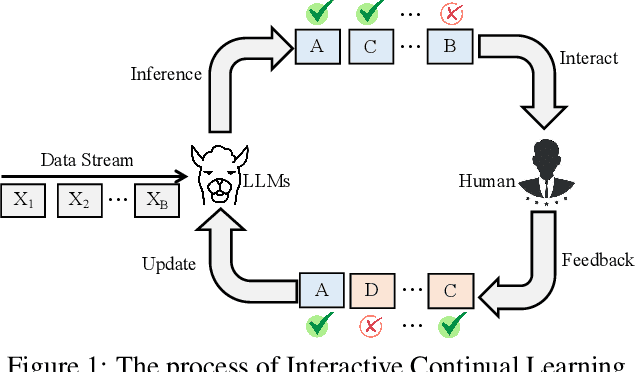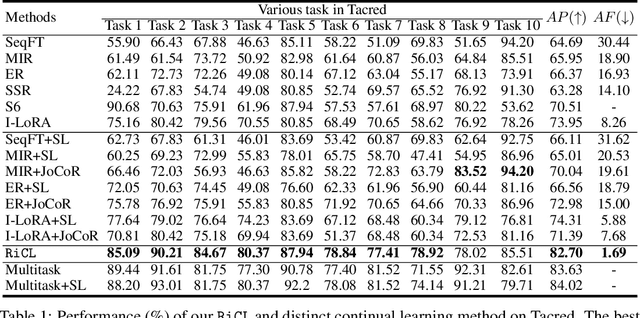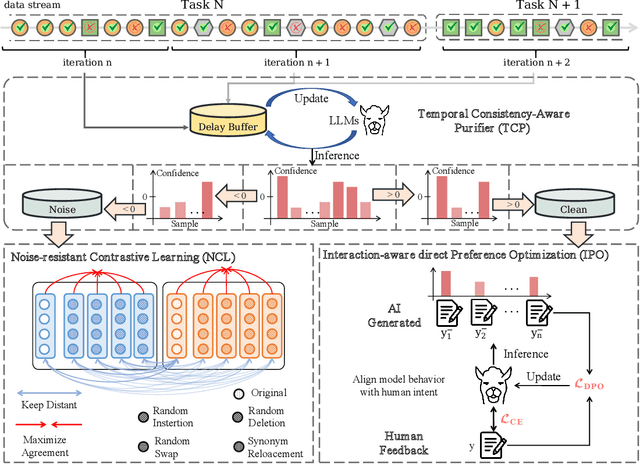Yutao Yang
PsychEval: A Multi-Session and Multi-Therapy Benchmark for High-Realism AI Psychological Counselor
Jan 08, 2026Abstract:To develop a reliable AI for psychological assessment, we introduce \texttt{PsychEval}, a multi-session, multi-therapy, and highly realistic benchmark designed to address three key challenges: \textbf{1) Can we train a highly realistic AI counselor?} Realistic counseling is a longitudinal task requiring sustained memory and dynamic goal tracking. We propose a multi-session benchmark (spanning 6-10 sessions across three distinct stages) that demands critical capabilities such as memory continuity, adaptive reasoning, and longitudinal planning. The dataset is annotated with extensive professional skills, comprising over 677 meta-skills and 4577 atomic skills. \textbf{2) How to train a multi-therapy AI counselor?} While existing models often focus on a single therapy, complex cases frequently require flexible strategies among various therapies. We construct a diverse dataset covering five therapeutic modalities (Psychodynamic, Behaviorism, CBT, Humanistic Existentialist, and Postmodernist) alongside an integrative therapy with a unified three-stage clinical framework across six core psychological topics. \textbf{3) How to systematically evaluate an AI counselor?} We establish a holistic evaluation framework with 18 therapy-specific and therapy-shared metrics across Client-Level and Counselor-Level dimensions. To support this, we also construct over 2,000 diverse client profiles. Extensive experimental analysis fully validates the superior quality and clinical fidelity of our dataset. Crucially, \texttt{PsychEval} transcends static benchmarking to serve as a high-fidelity reinforcement learning environment that enables the self-evolutionary training of clinically responsible and adaptive AI counselors.
Black-box Model Merging for Language-Model-as-a-Service with Massive Model Repositories
Sep 16, 2025



Abstract:Model merging refers to the process of integrating multiple distinct models into a unified model that preserves and combines the strengths and capabilities of the individual models. Most existing approaches rely on task vectors to combine models, typically under the assumption that model parameters are accessible. However, for extremely large language models (LLMs) such as GPT-4, which are often provided solely as black-box services through API interfaces (Language-Model-as-a-Service), model weights are not available to end users. This presents a significant challenge, which we refer to as black-box model merging (BMM) with massive LLMs. To address this challenge, we propose a derivative-free optimization framework based on the evolutionary algorithm (Evo-Merging) that enables effective model merging using only inference-time API queries. Our method consists of two key components: (1) sparsity-based denoising, designed to identify and filter out irrelevant or redundant information across models, and (2) sign-aware scaling, which dynamically computes optimal combination weights for the relevant models based on their performance. We also provide a formal justification, along with a theoretical analysis, for our asymmetric sparsification. Extensive experimental evaluations demonstrate that our approach achieves state-of-the-art results on a range of tasks, significantly outperforming existing strong baselines.
Forget What's Sensitive, Remember What Matters: Token-Level Differential Privacy in Memory Sculpting for Continual Learning
Sep 16, 2025



Abstract:Continual Learning (CL) models, while adept at sequential knowledge acquisition, face significant and often overlooked privacy challenges due to accumulating diverse information. Traditional privacy methods, like a uniform Differential Privacy (DP) budget, indiscriminately protect all data, leading to substantial model utility degradation and hindering CL deployment in privacy-sensitive areas. To overcome this, we propose a privacy-enhanced continual learning (PeCL) framework that forgets what's sensitive and remembers what matters. Our approach first introduces a token-level dynamic Differential Privacy strategy that adaptively allocates privacy budgets based on the semantic sensitivity of individual tokens. This ensures robust protection for private entities while minimizing noise injection for non-sensitive, general knowledge. Second, we integrate a privacy-guided memory sculpting module. This module leverages the sensitivity analysis from our dynamic DP mechanism to intelligently forget sensitive information from the model's memory and parameters, while explicitly preserving the task-invariant historical knowledge crucial for mitigating catastrophic forgetting. Extensive experiments show that PeCL achieves a superior balance between privacy preserving and model utility, outperforming baseline models by maintaining high accuracy on previous tasks while ensuring robust privacy.
Building Self-Evolving Agents via Experience-Driven Lifelong Learning: A Framework and Benchmark
Aug 26, 2025Abstract:As AI advances toward general intelligence, the focus is shifting from systems optimized for static tasks to creating open-ended agents that learn continuously. In this paper, we introduce Experience-driven Lifelong Learning (ELL), a framework for building self-evolving agents capable of continuous growth through real-world interaction. The framework is built on four core principles: (1) Experience Exploration: Agents learn through continuous, self-motivated interaction with dynamic environments, navigating interdependent tasks and generating rich experiential trajectories. (2) Long-term Memory: Agents preserve and structure historical knowledge, including personal experiences, domain expertise, and commonsense reasoning, into a persistent memory system. (3) Skill Learning: Agents autonomously improve by abstracting recurring patterns from experience into reusable skills, which are actively refined and validated for application in new tasks. (4) Knowledge Internalization: Agents internalize explicit and discrete experiences into implicit and intuitive capabilities as "second nature". We also introduce StuLife, a benchmark dataset for ELL that simulates a student's holistic college journey, from enrollment to academic and personal development, across three core phases and ten detailed sub-scenarios. StuLife is designed around three key paradigm shifts: From Passive to Proactive, From Context to Memory, and From Imitation to Learning. In this dynamic environment, agents must acquire and distill practical skills and maintain persistent memory to make decisions based on evolving state variables. StuLife provides a comprehensive platform for evaluating lifelong learning capabilities, including memory retention, skill transfer, and self-motivated behavior. Beyond evaluating SOTA LLMs on the StuLife benchmark, we also explore the role of context engineering in advancing AGI.
Reinforced Interactive Continual Learning via Real-time Noisy Human Feedback
May 15, 2025



Abstract:This paper introduces an interactive continual learning paradigm where AI models dynamically learn new skills from real-time human feedback while retaining prior knowledge. This paradigm distinctively addresses two major limitations of traditional continual learning: (1) dynamic model updates using streaming, real-time human-annotated data, rather than static datasets with fixed labels, and (2) the assumption of clean labels, by explicitly handling the noisy feedback common in real-world interactions. To tackle these problems, we propose RiCL, a Reinforced interactive Continual Learning framework leveraging Large Language Models (LLMs) to learn new skills effectively from dynamic feedback. RiCL incorporates three key components: a temporal consistency-aware purifier to automatically discern clean from noisy samples in data streams; an interaction-aware direct preference optimization strategy to align model behavior with human intent by reconciling AI-generated and human-provided feedback; and a noise-resistant contrastive learning module that captures robust representations by exploiting inherent data relationships, thus avoiding reliance on potentially unreliable labels. Extensive experiments on two benchmark datasets (FewRel and TACRED), contaminated with realistic noise patterns, demonstrate that our RiCL approach substantially outperforms existing combinations of state-of-the-art online continual learning and noisy-label learning methods.
Recent Advances of Foundation Language Models-based Continual Learning: A Survey
May 28, 2024Abstract:Recently, foundation language models (LMs) have marked significant achievements in the domains of natural language processing (NLP) and computer vision (CV). Unlike traditional neural network models, foundation LMs obtain a great ability for transfer learning by acquiring rich commonsense knowledge through pre-training on extensive unsupervised datasets with a vast number of parameters. However, they still can not emulate human-like continuous learning due to catastrophic forgetting. Consequently, various continual learning (CL)-based methodologies have been developed to refine LMs, enabling them to adapt to new tasks without forgetting previous knowledge. However, a systematic taxonomy of existing approaches and a comparison of their performance are still lacking, which is the gap that our survey aims to fill. We delve into a comprehensive review, summarization, and classification of the existing literature on CL-based approaches applied to foundation language models, such as pre-trained language models (PLMs), large language models (LLMs) and vision-language models (VLMs). We divide these studies into offline CL and online CL, which consist of traditional methods, parameter-efficient-based methods, instruction tuning-based methods and continual pre-training methods. Offline CL encompasses domain-incremental learning, task-incremental learning, and class-incremental learning, while online CL is subdivided into hard task boundary and blurry task boundary settings. Additionally, we outline the typical datasets and metrics employed in CL research and provide a detailed analysis of the challenges and future work for LMs-based continual learning.
 Add to Chrome
Add to Chrome Add to Firefox
Add to Firefox Add to Edge
Add to Edge